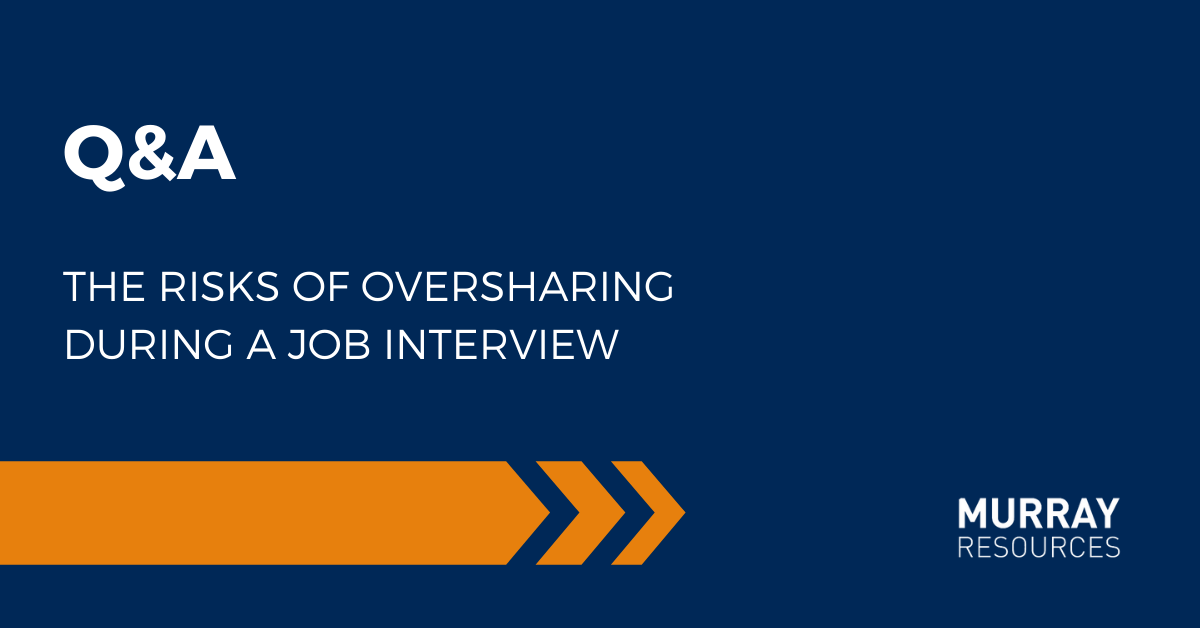The Risks of Oversharing: What Candidates Should Keep to Themselves in Interviews
March 27, 2025

We’ve all heard that honesty is the best policy, but in job interviews, there’s a fine line between being open – and oversharing. While hiring managers appreciate authenticity, sharing too much, whether it’s personal details or workplace frustrations, can backfire. Knowing what to say (and what to keep to yourself) is key to making a strong, professional impression. Here’s what candidates should avoid oversharing in interviews, why it matters, and what to focus on instead.
Key Takeaways
- Keep It Professional – Avoid discussing personal struggles, financial issues, or past negative work experiences that could shift the focus away from your qualifications.
- Frame Challenges Positively – If you need to discuss obstacles, present them as learning experiences that highlight problem-solving and resilience.
- Stay Strategic – Only share personal information when necessary, such as when addressing employment gaps or requesting accommodations, and always keep the focus on solutions.
Why Oversharing in Job Interviews Can be Risky

Job interviews are all about making a strong impression. While honesty is important, oversharing personal details can create unnecessary concerns for employers. The hiring process is designed to assess a job candidate’s qualifications, cultural fit, and potential contributions to a company. Striking the right balance between being authentic and professional ensures that you present yourself in the best light.
So while it may seem like a good idea to be open in an interview, too much personal information and sharing certain details can raise concerns for hiring managers.
👉 Here’s how oversharing can be risky during a job interview:
- Raise Red Flags: Even if your personal challenges don’t affect your job performance, discussing them in a job interview might lead employers to question your reliability or long-term stability. They might worry about how external factors will impact your work, even if you have everything under control.
- Create Perceived Obstacles: When you share too much, you risk giving hiring managers reasons to doubt whether you’re the right fit for the role. Employers want a job applicant who is prepared, adaptable, and focused. If your personal challenges become the focal point of the conversation, the hiring manager might end up seeing you as a potential risk rather than an asset.
- Lead to Unconscious Bias: While employers are legally prohibited from discriminating based on factors like health or family status, unconscious bias can still play a role in hiring decisions. Sharing too much about personal challenges may unintentionally influence the interviewer’s perception of your fit for the role.
🔹Tip: Looking for some extra support in navigating the job search? ResumeSpice (a company built by recruiters) offers professional interview prep!
Topics to Avoid in Interviews (and What to Focus on Instead!)

While it’s important to be open and engaging during interviews, some topics are best left unsaid.
Here are key areas to avoid diving into during a job interview:
❌ Personal Health Issues
Unless your health directly impacts your ability to perform essential job functions and requires workplace accommodations, it’s best to keep this information private. Employers are legally prohibited from discriminating based on health conditions, but unfortunately, that doesn’t mean unconscious bias won’t come into play.
❌ Family or Financial Struggles
While it’s okay to be human, discussing financial difficulties or family drama can shift the conversation away from your qualifications. Employers want to know if you’re the right fit for the job, not the details of your personal life.
❌ Negative Past Work Experiences
Badmouthing a former employer can make you appear unprofessional. Even if you had a toxic boss or a challenging work environment, complaining about it in an interview may raise red flags. Hiring managers might wonder how you’ll speak about their company in the future.
The key to a successful interview is steering the conversation toward your strengths, skills, and enthusiasm for the role. Here’s what to focus on instead:
✅ Strengths and Achievements
Keep the conversation centered on what makes you the best candidate for the job. Highlight key skills, past accomplishments, and experiences that demonstrate your ability to succeed.
✅ Adaptability and Problem-Solving
If you need to discuss challenges, frame them as learning experiences that helped you grow professionally. This shows resilience and a problem-solving mindset.
✅ Enthusiasm for the Role
Employers want to see that you’re motivated, engaged, and ready to contribute to their team. Make sure your responses reflect genuine excitement about the position.
🔹Tip: Even when interviewers ask open-ended questions like “Tell me about yourself,” it’s important to keep your response professional and relevant to the job description. Sharing too much about personal struggles, financial difficulties, or past hardships can shift the focus away from your qualifications.
When to Be Transparent During Your Job Interview

Sharing personal information can be necessary in certain situations, but it’s important to be strategic. Here are times when it’s appropriate to disclose:
- When Directly Asked– If an employer asks about a specific issue, such as a gap in employment, respond truthfully and concisely. Prepare in advance so you can provide an honest, professional answer that focuses on your readiness to contribute.
- When It Impacts Your Job Performance– If a personal issue affects your work or requires accommodations, it’s important to discuss it. Frame the conversation around solutions, emphasizing how you plan to manage the issue and maintain performance.
- When It Benefits the Workplace– If sharing personal information helps your manager or team understand your situation and improve work dynamics, it can be beneficial. Keep the focus on how you’ll continue to contribute effectively despite challenges.
🔹Remember: Job interviews are a two-way street. While it’s important to be mindful of what you share, you should also feel comfortable being authentic and ensuring the workplace aligns with your values and needs! Check out our blog that dives further into how to know if you’re a great fit for the job you want.
Striking the Right Balance- Be Authentic, But Strategic

Navigating the fine line between being open and oversharing can be challenging, but it’s crucial for maintaining a professional image. Here are some tips to help you strike the right balance:
✔️ Prepare Your Answers
Anticipate common questions and prepare your responses. This preparation can help you stay focused on your professional qualifications and achievements without veering into overly personal territory.
Here are a few ways you should and should not approach common interview questions:
Q: “Why are you interested in this role?”
❌ “I am interested in this job because I really need the money. ”
✅ “I’m excited about this opportunity because my skills in sales development align with the company’s needs, and I thrive in this kind of work environment.”
Q: “Why did you leave your last job?”
❌ “I had a really negative experience with my team.”
✅ “In my previous role, I learned a lot about adapting to different team dynamics and improving communication skills. I’m excited to bring that experience to a company culture like yours.”
Q: “What’s your biggest weakness?”
❌ “I work too hard and care too much.”
✅ “I used to struggle with time management when balancing multiple projects, but I’ve developed strategies like prioritization and time-blocking to stay on track.”
Q: “Can you explain this gap in your resume?”
❌ “I was unemployed for a while because of personal issues.”
✅ “During that time, I focused on personal development by taking courses in [relevant skill] and staying up to date with industry trends.”
✔️ Focus on Positives
Steer the conversation toward your strengths, skills, and valuable experiences. Instead of dwelling on challenges or past setbacks, highlight what you bring to the table and how your background makes you an excellent fit for the role.
✔️ Practice Discretion
Practice discretion and maintain professional boundaries to ensure you are presenting yourself in the best possible light. By focusing on your strengths, keeping overly personal details private, and framing past experiences positively, you’ll create a professional and confident impression.
🔹 Remember: Interviews are about showcasing your value- so keep the conversation centered on what makes you the best fit for the job market.
Summary
Oversharing in interviews can potentially harm a job seeker’s chances by raising red flags, creating perceived obstacles, and leading to unconscious bias. While honesty is important, it’s crucial to strike a balance between being open and maintaining professionalism. Candidates should avoid discussing overly personal topics like health issues, financial struggles, or negative past work experiences. Instead, they should focus on their strengths, adaptability, and enthusiasm for the role to leave a positive impression.
Q&A

Q: What should I do if an interviewer asks about a gap in my resume?
A: Be honest but professional. Focus on what you did during that time, such as taking courses or gaining new skills, rather than dwelling on personal struggles.
Q: Is it ever okay to discuss past job challenges?
A: Yes, but only if framed constructively. Instead of badmouthing a previous employer, highlight what you learned and how it made you a stronger professional.
Q: How can I ensure I don’t overshare in an interview?
A: Prepare answers in advance, keep responses focused on your qualifications, and practice discretion to maintain a professional and confident impression.
Work with the Best Staffing Agency in Houston
If you’re searching for a new job and are interested in working with a recruiter, turn to Murray Resources. We can help you navigate your way through your search, so you land a job you love. Take a look at our current job openings or contact us today to get started.
